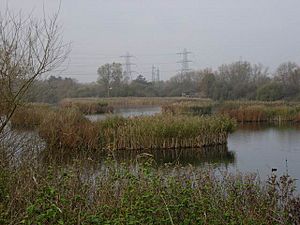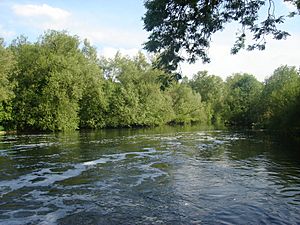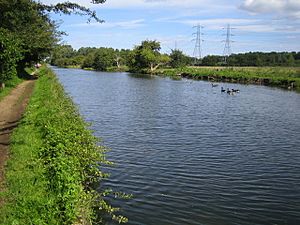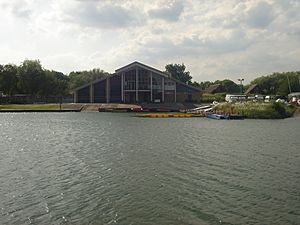River Lee Country Park facts for kids
The River Lee Country Park is a huge and exciting place to explore! It's part of the bigger Lee Valley Park and is looked after by the Lee Valley Regional Park Authority. This amazing park covers about 1,000 acres (that's like 500 football fields!) on both sides of the River Lee Navigation.
You can find it between the towns of Waltham Abbey and Broxbourne. The park is full of beautiful lakes, winding rivers, and wide-open spaces. It's also home to three special nature areas called Sites of Special Scientific Interest (SSSI). You can easily explore the park using its many footpaths and cycle tracks. This park is so big it even crosses the border between Hertfordshire and Essex counties!
Contents
A Look Back: How the Park Began
The area where the River Lee Country Park now sits was once part of the River Lea's natural flood plain. For a long time, starting in the 1930s, this land was used for digging up sand and gravel. This is why you see so many large lakes here today – they are old gravel pits!
Some of these lakes were even used to bury waste. But thanks to a big effort by the St Albans Sand and Gravel Company and the Lee Valley Regional Park Authority, the area has been completely changed. Now, much of the park is a protected Site of Special Scientific Interest, full of nature.
Olympic Excitement: Canoeing in 2012
Did you know the park played a part in the 2012 Summer Olympics? The Showground site, located near Waltham Cross, was chosen to host the exciting canoeing events. This special spot is now known as the Lee Valley White Water Centre. It's a fantastic place where you can still try out white water sports!
Exploring the Park's Waterways
The River Lee Country Park is famous for its many different waterways. These rivers and streams are home to lots of wildlife and offer great places for activities. Here are some of the main ones you'll find:
- Cornmill Stream: This stream flows from the River Lea at Fishers Green and later joins the Lea again near Waltham Abbey.
- Millhead Stream: You can find this stream flowing through the historic Waltham Abbey Royal Gunpowder Mills at Waltham Abbey.
- River Lea: This is the main river that gives the park its name.
- River Lee Flood Relief Channel: This channel helps manage water levels and includes parts of the old Horsemill Stream near Waltham Abbey.
- River Lee Navigation: This is a canalized section of the river, used for boats.
- Small River Lea: Another important waterway within the park.
Discovering the Park's Lakes
The park is dotted with many beautiful lakes, some of which are very large. These lakes are perfect for wildlife spotting, fishing, and other water activities. Some of them are even part of the Turnford and Cheshunt Pits SSSI.
Here are some of the bigger lakes you can visit:
- Bowyers Water: This lake is thought to have been dug by hand way back in the 1920s, making it one of the oldest lakes in the Lee Valley.
- Cheshunt Lake: This lake is home to the Herts Young Mariners, a group that teaches young people about sailing and water sports.
- Friday Lake: If you love fishing, this lake is a popular spot for catching carp.
- Hall Marsh Scrape: This lake was specially built to be a perfect home for different kinds of wildfowl (water birds).
- Holyfield Lake: This huge lake covers about 180 acres and includes a part of the River Lee Flood Relief Channel.
- Hooks Marsh Lake: Keep an eye out for the amazing bittern bird here! They often spend the winter months (December to March) at this lake.
- North Metropolitan: Also known as North Met Pit, this lake has many islands and small inlets. Its shoreline is about 4 miles long!
- Seventy Acres Lake: This is another great place to spot wildlife. You might see the rare bittern or even an otter here!
- Turnford Pits: Near these lakes, you can find small patches of old, untouched grassland that were there before the gravel was dug out.
Special Places for Nature: Sites of Special Scientific Interest (SSSI)
The River Lee Country Park is so important for nature that it contains three special areas called Sites of Special Scientific Interest (SSSI). These are places that have been officially recognized for their unique plants, animals, or geology. They are protected to make sure their special features are kept safe for the future.
The three SSSIs in the park are:
 | Isaac Myers |
 | D. Hamilton Jackson |
 | A. Philip Randolph |





